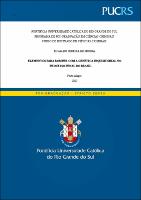| Compartilhe o registro |


|
Use este identificador para citar ou linkar para este item:
https://tede2.pucrs.br/tede2/handle/tede/10637| Tipo do documento: | Dissertação |
| Título: | Elementos para romper com a genética inquisitorial no processo penal do Brasil |
| Autor: | Moura, Edvaldo Pereira de |
| Primeiro orientador: | Giacomolli, Nereu José |
| Resumo: | Por intermédio da presente Dissertação e sob a orientação do professor Nereu José Giacomolli, pretende-se oferecer um contributo argumentativo sobre a indispensabilidade do rompimento com a genética inquisitorial existente no Processo Penal brasileiro, inspirado no Código fascista italiano de 1930, do teórico Vincenzo Manzini, a fim de que se possa implementar, de fato, um sistema de Justiça Criminal mais humano e democrático, fundado nos regramentos legais, convencionais e constitucionais da Carta Política de 1988, placitados pelo Brasil, ao longo dos anos. A consecução de tais propósitos, todavia, jamais se efetivará sem judicioso conhecimento técnico-jurídico e sem a experiência político-criminal dos juristas penais e processuais penais vanguardistas, adeptos do garantismo e do minimalismo penal, que levem em consideração os direitos fundamentais do investigado, acusado ou réu. Por fim, para o esperado êxito de tão ingente e complexa missão, é de rigor que os agentes políticos do legislativo, do executivo, do judiciário e de execução penal se empenhem e terçam armas, nesses quatro níveis, com operadores jurídicos infensos às pregações do senso comum e à visão inquisitorial da Justiça Criminal, responsáveis pela conhecida inflação legislativa, com a indevida tipificação de condutas penais de ofensividade mínima, quase inexistente e, ainda, por julgamentos desumanos e antidemocráticos. |
| Abstract: | Through the thesis to which we have proposed, and under the guidance from professor, Nereu José Giacomolli, we aim to offer a plain argumentative position about the indispensability of the disruption with the inquisitive genetics of the Brazilian criminal procedural law, which was inspired by the fascist criminal code, Codice Rocco, from 1930, written by the theoretician Vincenzo Manzini, aiming to be able to implement, for real, a humane and democratic Criminal Justice system, founded on the statutes of the Brazilian Constitution of 1988, and on the treaties and conventions pleaded by Brazil, with which we completely agree. Let it be registered that, for the achievement of such propositions, we have to take possession of the knowledge and experience of the criminalists and criminal procedural authors with avant-garde opinions, supporters of the criminal minimalism and of the legitimate guarantism. At last, we acknowledge that, for the success of this difficult mission, we need to be armed both in the sphere of legislation, by mitigating the repressive rage, and in the one of the jurisdiction, with humane, correct and fair decisions. In the scope of Criminal Law, we have an actual legislative inflation, with the typification of criminal norms with minimum or dubious offensive potential and, within the scope of jurisdiction, we need judges who act and work with a humanistic and democratic formation and, above all, capable, competent, courageous and impartial. |
| Palavras-chave: | Processo Penal Inquisitorialismo Autoritarismo Criminal Procedural Law Authoritarianism Inquisitive |
| Área(s) do CNPq: | CIENCIAS SOCIAIS APLICADAS::DIREITO |
| Idioma: | por |
| País: | Brasil |
| Instituição: | Pontifícia Universidade Católica do Rio Grande do Sul |
| Sigla da instituição: | PUCRS |
| Departamento: | Escola de Direito |
| Programa: | Programa de Pós-Graduação em Ciências Criminais |
| Tipo de acesso: | Acesso Aberto |
| Restrição de acesso: | Trabalho não apresenta restrição para publicação |
| URI: | https://tede2.pucrs.br/tede2/handle/tede/10637 |
| Data de defesa: | 30-Nov-2022 |
| Aparece nas coleções: | Programa de Pós-Graduação em Ciências Criminais |
Arquivos associados a este item:
| Arquivo | Descrição | Tamanho | Formato | |
|---|---|---|---|---|
| EDVALDO_ PEREIRA _DE _MOURA_DIS.pdf | EDVALDO_PEREIRA_DE_MOURA_DIS | 733,27 kB | Adobe PDF |  Baixar/Abrir Pré-Visualizar |
Os itens no repositório estão protegidos por copyright, com todos os direitos reservados, salvo quando é indicado o contrário.




